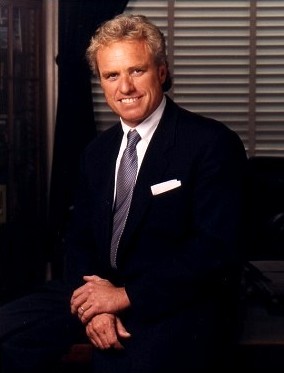Joseph P. Kennedy II
( politician) | ||||||||||
|---|---|---|---|---|---|---|---|---|---|---|
 | ||||||||||
| Born | September 24, 1952 Boston, Massachusetts | |||||||||
| Nationality | US | |||||||||
| Alma mater | • Milton Academy • Manter Hall School • University of California (Berkeley) • University of Massachusetts Boston | |||||||||
| Parents | • • Ethel Kennedy | |||||||||
| Children | Joe Kennedy III | |||||||||
| Siblings | ||||||||||
| Spouse | • Sheila Brewster Rau • Anne Kelly | |||||||||
| Member of | Kennedy family, WEF/Global Leaders for Tomorrow/1993 | |||||||||
Former Congressman and part of the Kennedy family.
| ||||||||||
Joseph Patrick Kennedy II is an American businessman and former representative of the 8th district of Massachusetts (between 1987 and 1999). He is the eldest son of attorney general Robert Francis Kennedy and his wife Ethel Kennedy.
He was selected a Young Global Leader by the World Economic Forum in 1993, when he was Congressman.
In 1979 he founded and, until he was elected to the U.S. House, led Citizens Energy Corporation, a non-profit energy company which provides heating oil to low-income and elderly families in Massachusetts. Since 1999, Kennedy has continued to lead Citizens Energy, which has now become a leader in green energy development.
Early life, education, and early business career
Joseph Patrick Kennedy II also better known as Joe was born in Brighton, a neighborhood of Boston, Massachusetts, the second of 11 children of Ethel (Skakel) and Robert Francis Kennedy.[1] He was named after his grandfather Joseph P. Kennedy Sr., the patriarch of the Kennedy family. He had a troubled youth and was expelled from several private schools as a result of his quick temper. He regularly got into fights with his younger brothers and male cousins.[1] He was 15 when his father was assassinated. A restless, impulsive teenager, he left Milton Academy, a private, college preparatory school, in Milton, Massachusetts, later graduating from the Manter Hall School—also a private, college-preparatory school—in Cambridge, Massachusetts, in 1971. During his time at Milton, he was roommates with Thomas C. Wales.[2][3]
On February 22, 1972, Kennedy was on Lufthansa Flight 649 when it was hijacked. Shortly after the inflight movie began during the 747's flight from New Delhi to Athens, five gunmen seized the jet and forced it to land at Aden International Airport, where all hostages were released the following day.[4][5]
In August 1973, a Jeep he was driving on Nantucket overturned, fracturing one of his brother David Kennedy's vertebrae and permanently paralyzing David's girlfriend, Pam Kelley.[6] The police cited Kennedy with reckless driving and the judge temporarily suspended his driver's license.[1][6] The Kennedy family paid for Kelley's initial medical treatment and minorly contributed to her continued care during the years following the accident.[7] Kelley died on November 20, 2020, leaving behind among others, a 31-year-old daughter and two grandsons.
Kennedy returned to school after the accident and graduated with a Bachelor of Arts degree from the University of Massachusetts Boston in 1976.[8]
In 1979 Kennedy founded Citizens Energy, a nonprofit organization, to provide discounted heating oil to low-income families. In 2010, Kennedy transformed the organization to become a leader in renewable energy generation while continuing to use profits to provide energy savings to low-income families.[9]
Congress
In 1986 incumbent Democrat and Speaker of the House Thomas Phillip "Tip" O'Neill Jr., who had held 8th Congressional district of Massachusetts seat since 1953, announced his retirement. Kennedy decided to run for the seat, which his uncle, former president John F. Kennedy, had held from 1947 to 1953. The Democratic nomination was contested by a number of well-known Democrats including state senator George Bachrach and state representative Mel King. However, Kennedy garnered endorsements from The Boston Globe and the retiring O'Neill. Kennedy won the primary with 53%.[10]
Throughout his career in the U.S. House, Kennedy served on the House Banking Committee, where he played an active role in the federal saving-and-loan bailout, credit-reporting reform, the overhaul of The Glass–Steagall Act of 1933 (ledaing to the 2007 financial crisis) and financial easing of regulations. Kennedy was also on the House Veterans' Affairs Committee, passing legislation to strengthen the veterans' health-care system, to investigate the causes of Gulf War syndrome, and to provide medical treatment for veterans of the Persian Gulf War.
References
- ↑ Jump up to: a b c https://archive.org/details/americanlegacyst00heym/page/194
- ↑ Osborne, David (April 1985). "Joe Kennedy Makes a Name for Himself". Mother Jones. p. 20.
- ↑ http://www.thecrimson.com/article.aspx?ref=128957
- ↑ "RFK's Son Freed by Hijackers", Oakland Tribune, Feb. 22, 1972; "$5 Million Paid to Jet Hijackers", Tribune, Feb. 25, 1972
- ↑ http://news.bbc.co.uk/onthisday/hi/dates/stories/february/23/newsid_2518000/2518731.stm
- ↑ Jump up to: a b Canellos, Peter S. Last Lion: The Fall and Rise of Ted Kennedy. p. 194. New York: Simon & Schuster, 2009
- ↑ Taraborrelli, J. Randy. Jackie, Ethel, Joan: Women of Camelot, p. 423. New York: Grand Central Publishing, 2000
- ↑ Walker, P. Wayne. 1997 Congressional Staff Directory (49th Edition), p. 111. Washington, DC: Congressional Quarterly Books, June 1997
- ↑ https://www.businesswire.com/news/home/20111216006190/en/Independent-Transmission-Company-Becomes-Newest-Member-of-California-ISO-Grid
- ↑ http://www.ourcampaigns.com/RaceDetail.html?RaceID=38338%7Cpublisher=OurCampaigns.com
Wikipedia is not affiliated with Wikispooks. Original page source here